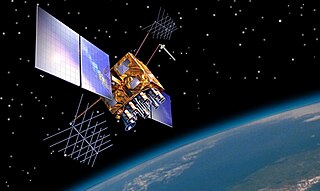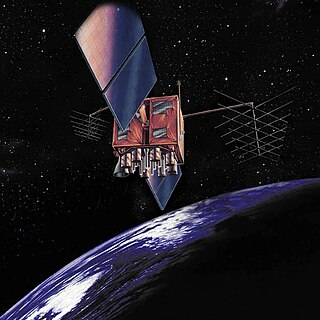
USA-201, also known as GPS IIR-19(M), GPS IIRM-6 and GPS SVN-48, is an American navigation satellite which forms part of the Global Positioning System. It was the sixth of eight Block IIRM satellites to be launched, and the nineteenth of twenty one Block IIR satellites overall. It was built by Lockheed Martin, using the AS-4000 satellite bus.
USA-47, also known as GPS II-4 and GPS SVN-19, was an American navigation satellite which formed part of the Global Positioning System. It was the fourth of nine Block II GPS satellites to be launched, which were the first operational GPS satellites to fly.

USA-132, also known as GPS IIR-2 and GPS SVN-43, is an American navigation satellite which forms part of the Global Positioning System. It was the second Block IIR GPS satellite to be launched, out of thirteen in the original configuration, and twenty one overall. GPS IIR-1 failed to achieve orbit, so USA-132 was the first successful Block IIR satellite. It was built by Lockheed Martin, using the AS-4000 satellite bus.

USA-145, also known as GPS IIR-3 and GPS SVN-46, is an American navigation satellite which forms part of the Global Positioning System. It was the third Block IIR GPS satellite to be launched, out of thirteen in the original configuration, and twenty one overall. It was built by Lockheed Martin, using the AS-4000 satellite bus.

USA-150, also known as GPS IIR-4 and GPS SVN-51, is an American navigation satellite which forms part of the Global Positioning System. It was the fourth Block IIR GPS satellite to be launched, out of thirteen in the original configuration, and twenty one overall. It was built by Lockheed Martin, using the AS-4000 satellite bus.

USA-154, also known as GPS IIR-6 and GPS SVN-41, is an American navigation satellite which forms part of the Global Positioning System. It was the sixth Block IIR GPS satellite to be launched, out of thirteen in the original configuration, and twenty one overall. It was built by Lockheed Martin, using the AS-4000 satellite bus.

USA-156, also known as GPS IIR-7 and GPS SVN-54, is an American navigation satellite which forms part of the Global Positioning System. It was the seventh Block IIR GPS satellite to be launched, out of thirteen in the original configuration, and twenty one overall. It was built by Lockheed Martin, using the AS-4000 satellite bus.

USA-166, also known as GPS IIR-8 and GPS SVN-56, is an American navigation satellite which forms part of the Global Positioning System. It was the eighth Block IIR GPS satellite to be launched, out of thirteen in the original configuration, and twenty one overall. It was built by Lockheed Martin, using the AS-4000 satellite bus.

USA-168, also known as GPS IIR-9 and GPS SVN-45, is an American navigation satellite which forms part of the Global Positioning System. It was the ninth Block IIR GPS satellite to be launched, out of thirteen in the original configuration, and twenty one overall. It was built by Lockheed Martin, using the AS-4000 satellite bus.

USA-175, also known as GPS IIR-10 and GPS SVN-47, is an American navigation satellite which forms part of the Global Positioning System. It was the tenth Block IIR GPS satellite to be launched, out of thirteen in the original configuration, and twenty one overall. It was built by Lockheed Martin, using the AS-4000 satellite bus.

USA-177, also known as GPS IIR-11 and GPS SVN-59, is an American navigation satellite which forms part of the Global Positioning System. It was the eleventh Block IIR GPS satellite to be launched, out of thirteen in the original configuration, and twenty one overall. It was built by Lockheed Martin, using the AS-4000 satellite bus.

USA-178, also known as GPS IIR-12 and GPS SVN-60, is an American navigation satellite which forms part of the Global Positioning System. It was the twelfth Block IIR GPS satellite to be launched, out of thirteen in the original configuration, and twenty one overall. It was built by Lockheed Martin, using the AS-4000 satellite bus.

USA-180, also known as GPS IIR-13 and GPS SVN-61, is an American navigation satellite which forms part of the Global Positioning System. It was the thirteenth of twenty one Block IIR GPS satellites to be launched, and the last in the original configuration. It was built by Lockheed Martin, using the AS-4000 satellite bus.

USA-183, also known as GPS IIR-14(M), GPS IIRM-1 and GPS SVN-53, is an American navigation satellite which forms part of the Global Positioning System. It was the first of eight Block IIRM satellites to be launched, and the fourteenth of twenty one Block IIR satellites overall. It was built by Lockheed Martin, using the AS-4000 satellite bus.

USA-190, also known as GPS IIR-15(M), GPS IIRM-2 and GPS SVN-52, is an American navigation satellite which forms part of the Global Positioning System. It was the second of eight Block IIRM satellites to be launched, and the fifteenth of twenty one Block IIR satellites overall. It was built by Lockheed Martin, using the AS-4000 satellite bus.

USA-192, also known as GPS IIR-16(M), GPS IIRM-3 and GPS SVN-58, is an American navigation satellite which forms part of the Global Positioning System. It was the third of eight Block IIRM satellites to be launched, and the sixteenth of twenty one Block IIR satellites overall. It was built by Lockheed Martin, using the AS-4000 satellite bus.

USA-196, also known as GPS IIR-17(M), GPS IIRM-4 and GPS SVN-55, is an American navigation satellite which forms part of the Global Positioning System. It was the fourth of eight Block IIRM satellites to be launched, and the seventeenth of twenty one Block IIR satellites overall. It was built by Lockheed Martin, using the AS-4000 satellite bus.

USA-199, also known as GPS IIR-18(M), GPS IIRM-5 and GPS SVN-57, is an American navigation satellite which forms part of the Global Positioning System. It was the fifth of eight Block IIRM satellites to be launched, and the eighteenth of twenty one Block IIR satellites overall. It was built by Lockheed Martin, using the AS-4000 satellite bus.

USA-203, also known as GPS IIR-20(M), GPS IIRM-7 and GPS SVN-49, is an American navigation satellite which was intended to become part of the Global Positioning System. It was the sixth of seven Block IIRM satellites to be launched, and the twentieth of twenty one Block IIR satellites overall. It was built by Lockheed Martin, using the AS-4000 satellite bus, and had a mass of 2,032 kilograms (4,480 lb).

USA-232, also known as GPS IIF-2, and GPS SVN-63, is an American navigation satellite which forms part of the Global Positioning System. It was the second of twelve Block IIF satellites to be launched.



